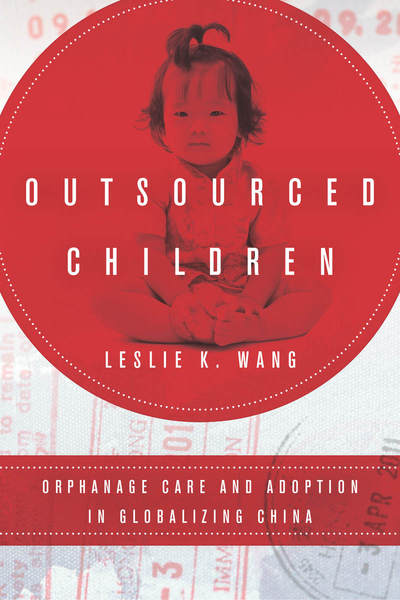
2016
208 pages.
from $28.00
Paperback now $14.00 (50% off)
Hardcover ISBN: 9780804799010
Paperback ISBN: 9781503600119
Ebook ISBN: 9781503600126
Winner of the 2017 Choice Award for Outstanding Academic Title, sponsored by the American Library Association.
It's no secret that tens of thousands of Chinese children have been adopted by American parents and that Western aid organizations have invested in helping orphans in China—but why have Chinese authorities allowed this exchange, and what does it reveal about processes of globalization?
Countries that allow their vulnerable children to be cared for by outsiders are typically viewed as weaker global players. However, Leslie K. Wang argues that China has turned this notion on its head by outsourcing the care of its unwanted children to attract foreign resources and secure closer ties with Western nations. She demonstrates the two main ways that this "outsourced intimacy" operates as an ongoing transnational exchange: first, through the exportation of mostly healthy girls into Western homes via adoption, and second, through the subsequent importation of first-world actors, resources, and practices into orphanages to care for the mostly special needs youth left behind.
Outsourced Children reveals the different care standards offered in Chinese state-run orphanages that were aided by Western humanitarian organizations. Wang explains how such transnational partnerships place marginalized children squarely at the intersection of public and private spheres, state and civil society, and local and global agendas. While Western societies view childhood as an innocent time, unaffected by politics, this book explores how children both symbolize and influence national futures.
About the author
Leslie K. Wang is Assistant Professor of Sociology at the University of Massachusetts, Boston.
"Outsourced Children takes us into the world of 'relinquished children' in China. It offers insights into the role of state policy, global competition and transnational circuits in shaping the meanings and value of children within neoliberalism. This is a must-read book for anyone interested in childhood in the global era."
—Nazli Kibria, Boston University
"Outsourced Children is a provocative analysis of the global assemblages of care around children in Chinese orphanages. Drawing on a deep well of original fieldwork, Wang bring to life the ideologies, economic inequalities, and gendered and raced imaginaries that swirl around children at the intersections of 'soft power' and 'outsourced intimacy.'"
—Sara Dorow, University of Alberta
"Wang's compelling ethnography shows how state agendas, market imperatives, and conflicting visions of childcare held by Western do-gooders and Chinese caregivers create a transnational market in special needs children that serves different agendas. A caringly crafted, unsettling, yet humane account of how the one-child policy continues to remake our world."
—Susan Greenhalgh, Harvard University
"Wang's vivid and accessible writing, and her ability to raise difficult issues about the best interests of children in local, national, and transnational contexts makes Outsourced Children a compelling read for undergraduate and graduate students, policymakers, and general readers. "
—Catherine Ceniza Choy, H-Diplo
"A reflexive approach Wang employs in the presentation of her ethnographic study definitely plays a significant role in this book. Readers are able to understand how the author's analyses have come about through the discussion of her own identities and subjectivity, which is a methodological strength of the book. Compelling parts of Outsourced Children include Wang's analysis of a particular type of globalization process in which children are the integral part of the PRC's movement toward modernization as well as how the children serve an important role in Westerners' desire to participate prominently in international humanitarianism."
—Kazuyo Kubo, American Journal of Sociology
"Outsourced Children: Orphanage Care and Adoption in Globalizing China offers rich insight into global power dynamics at political and personal levels and serves as a catalyst for further inquiries into international relations, experiences of marginalized populations, and the shifting salience of transnational, racial, and ethnic identities."––Michelle Samura, Cala Gin, Dorcas Hot, and Florencia Park, Journal of Asian American Studies